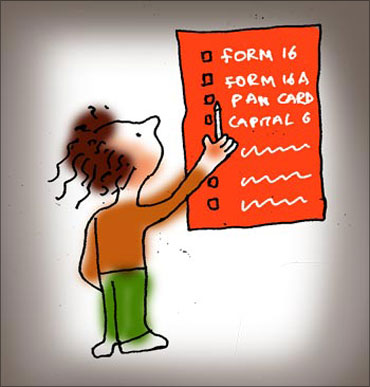 | « Back to article | Print this article |
Here's how salaried people can save taxes
The government cleared the Finance Bill 2010. Now that rules of the tax game are clear, it's important for you to establish your tax planning strategy, which should essentially be linked to your medium- and long-term financial goals.
As an early start gives you the edge of achieving the right balance between your investment growth and tax management, clearly, it is important to start right away.
Here's how you can effectively plan your taxes for the Financial Year (FY) 2010-11.
Click NEXT to find out...
Here's how salaried people can save taxes
Income from Salary
Section 17 of the Income Tax (IT) Act is all about taxation under the head 'salary'. In most of the cases, it is impossible for a salaried person to avoid tax on his income, except by way of deduction under chapter VI A of the IT Act.
However, there are ways that can help you minimise your total tax outgo if you plan accordingly.
Expecting a bonus? Everyone waits for that time of the year when they receive that lump sum called bonus from their employer. However, bonus is fully taxable on receipt basis and is included in your gross salary for the year in which you receive it. Can you limit the tax outgo on your bonus? Yes.
As bonus is a fully taxable component of an individual's salary, tax is applicable on it whenever it is paid.
Says Mahesh Padmanabhan, principal advisor, relaxwithtax.com, a taxation solutions provider: "An individual can get his/her employer to make the bonus payment in the subsequent year, thereby also pushing the tax liability to the subsequent year. This might benefit the employee if tax rates have been reduced or the tax slabs have been modified favourably."
If the bonus is to be paid in the current year, the best that can be done is to spread the resulting tax liability on the bonus over the remaining months in that financial year. By deferring the tax outflow over the remaining months on a piecemeal basis instead of lump sum tax payment, this will ensure that the individual's overall cash flow is better managed.
In certain cases, the employer deducts tax on the bonus before handing it over to the employee. In such cases, ensure that you give your tax-saving investment details to the employer so that you can get the maximum bonus on hand.
Click NEXT for more tips. . .
Here's how salaried people can save taxes
Take that trip. Under Section 10 (5) of the IT Act, you can claim tax exemptions using your leave travel allowance (LTA). In a favourable development for taxpayers, the Supreme Court recently ruled that employers are not obligated to collect and examine proofs related to LTA.
Theoretically, the LTA exemption rule stipulates that such exemption from tax can be claimed by an individual twice in a block of four years. One requires to produce domestic travel bills evidencing the fact of having undertaken a single journey.
Many individuals are unable to go on any vacation and, hence, end up losing the benefit of tax exemption on LTA. Such individuals can claim an additional exemption in the next block of four years. Here's an example to illustrate this point:
Suppose X, an employee, did not travel in the block of 2006-09 and, so, could not claim any exemption in this block. However, he can carry forward one journey to the succeeding block (2010-13) and can claim it in the first calendar year, i.e., 2010.
Thereafter, he can also claim the remaining two journeys of the block 2010-13. Accordingly, he may be eligible to avail three exemptions in the block 2010-13.
Says Parizad Sirwalla, partner at BSR & Co, a chartered accountants' firm: "If both spouses are getting the LTA benefit in their respective places of work, they can both claim the separate exemptions for separate journeys for travel with their respective set of dependent parents."
How to get the most out of perks. Click NEXT
Here's how salaried people can save taxes
Get the most out of those perks. For the salaried, perquisites make work a pleasure but tax plays a dampener. If an employee has the option of choosing between an employer-provided accommodation and an independent rented accommodation, a cost-benefit analysis will help him find the option that's more conducive to his tax outgo.
Generally, having a house rent allowance (HRA) component in the salary and paying rent is the better option. If one is using a motor car for official purposes as well as personal use, rather than use your own vehicle, it is advisable to take an employer-provided vehicle.
In that case, the taxable perquisite value is restricted to a maximum of Rs 3,300 per month (car with a driver) as against the actual expense being taxed when the vehicle is owned by the employee.
Tuning it right. Not many have the option to change their salary structure, but if your company is progressive or you are on good terms with your human resource department, you just might be able to squeeze in a few additions and deletions and save some tax in the process.
Here are some suggestions that experts like Mahesh have to offer:
- Opt for salary components such as reimbursement of attire expenses, books and periodicals, telephone expenses and medical expenses. These can yield small but profitable results.
- Change the arrangement from using your own car to a company-provided vehicle with driver this will go a long way in cutting your tax bill. If you want to use your own car, but do not want the related high perquisite taxation, you can buy the car in your spouse's name and lease it to your company, which in turn can let you use it. (Such an arrangement needs to be approved by your company as it may not want any tax-related hassles.)
- Small components such as food coupons, education allowance and transport allowance may bring in small but effective respite from taxes.
Click NEXT for more ways to save tax
Here's how salaried people can save taxes
Sops! Employee Stock Options (ESOPs) are preferred by many blue-chip company employees but, unfortunately, they are taxable.
Says Parizad: "Subject to provisions of ESOP plans and within the exercise period, the employee can choose to exercise his shares (where an option is available to the employee), at a time when the fair market value (FMV) of the shares is low. In such a case, the taxable salary income on allotment of ESOPs would be lower as it is directly proportional to the FMV of the shares on the date of exercise."
Income from Salary
- For a salaried employee, restructuring salary in his favour may not be easy. But you can still soften the tax blow:
- Use house rent allowance (HRA) -- it is partially exempted from tax, provided rent is actually paid.
- Avail tax exemption on HRA, and principal repayment of home loan under Section 80C.
- Furnish current employer details with Form 16 from the previous employer.
- Ensure that you furnish bills to claim reimbursements (e.g., medical).
- LTA is tax-exempt twice in four years upon furnishing requisite bills, if the employer asks for them.
- Remember, food coupons are exempt from tax.
- Get maximum tax benefit from employer-owned motor car that comes with reimbursement.
- After getting ESOPs, hold on to them for a year to avoid taxes. However, the lock-in period varies across employers.
How businessmen, high-income people can save tax: Click NEXT to find out
Here's how salaried people can save taxes
Income from Business or Profession
Section 28 of the IT Act pertains to income from business or profession. As per the income tax laws in India, a self-employed person can be a freelance writer/journalist, independent consultant, businessman, or a professional.
Tax calculations are easier for the salaried compared to those for the self-employed.
There are a few things that you should keep in mind. All expenses related to business or profession are deductible from the gross profit. In case you have any work-related capital assets, you can claim depreciation on them.
Carrying forward losses is allowed for the next eight years. Bills of capital expenditure should be maintained for the sake of record.
Managing taxes. Give priority to tax-saving instruments that do not demand long-term commitment. Incomes from business and profession are generally uneven, so it is in your best interest to avoid any large commitment at a particular point in time.
Remember to keep your personal investments and business surplus apart. Keep a list of the tax deducted at source (TDS) throughout the year.
Income from Business or Profession
If your source of income is a business or a profession, these are the key things you should know:
- Keep personal investments and business surplus apart.
- Business loss can be carried forward and set off against future profits for up to eight assessment years.
- As business income is not steady, avoid long-term financial commitments towards tax-saving products.
Click NEXT for more
Here's how salaried people can save taxes
Income from House Property
It is calculated by taking into account the annual value. Annual value is the highest of the actual rent received, rent as per the municipality's valuation and fair rent as determined by the IT department.
However, there are a few exemptions such as municipality tax and 30 per cent of net annual value (annual value less municipality tax for the year), which are deducted from the annual value to arrive at the taxable annual value. It is then added to other income and taxed according to the normal slab rate.
Income from House Property
Any income that's derived from a house property is taxable. Here are the things to keep in mind:
- Avail unlimited deduction for interest payment on the loan for your second house.
- Claim tax deduction on principal repayment under Section 80C of the Income Tax Act.
- Keep rent receipts for proof of rental income for tax filing later.
- Make sure that you collect the 'interest paid' and 'principal repayment' certificates from the home loan provider
Click NEXT for more
Here's how salaried people can save taxes
Income from Capital Gains
Any gains arising from the transfer of capital assets are capital gains. A capital asset can be an asset of any kind held by an individual whether or not connected with his business or profession. However, capital gains can be of two types according to the time for which the asset is held by the individual.
Long-term capital assets are assets held by an individual for a period of more than 36 months. However, in case of shares, equity mutual funds and debentures, the holding time period is 12 months.
On sale of any of these assets before a year and upon payment of a security transaction tax (STT), the flat tax rate is 15.45 per cent. One does not require to pay any taxes if these assets are transferred after one year of holding.
On sale of other assets such as property and physical gold, the short-term capital gain is added to other income and taxed accordingly.
However, the taxable amount is calculated after a few considerations: cost of acquisition (indexed cost in case of long term), cost of improvement (indexed cost of acquisition in case of long term), expenditure incurred at the time of acquisition and expenditure incurred wholly and exclusively in connection with such transfer.
Income from Capital Gains
A few things that you need to keep in mind if you have any income from capital gain:
Long-Term Capital Gains
- No tax on gains from sale of equity shares and equity mutual funds if sold after a year. Ensure that security transaction tax (STT) has been paid while making such transactions.
- For assets such as real estate and gold, 20 per cent tax after indexing.
Short-Term Capital Gains
- Tax of 15.45 per cent on gains from sale of equity shares and equity mutual fund if sold within a year. ensure that STT has been paid while making such transactions.
- From other assets such as real estate and gold -- as per your tax slab.
Saving Capital Gains
- Reinvest the gains in residential property or bonds such as NHAI/REC.
- Set off any short-term capital loss against short-term capital gains or taxable long-term capital gains.
Click NEXT for more commonsensical tips for you
Here's how salaried people can save taxes
Income from Other Sources
Section 56 of the IT Act says that you need to pay taxes on income that does not fall under any of the above heads. These include winnings from contests, gifts received and dividend income. Here's how to handle taxes on such incomes.
Says Vicky Mehta, senior research analyst with Morningstar India, an investment research firm: "According to the current tax provisions, dividend income from listed securities and units of equity and debt mutual funds is exempt from tax." Try to invest in these to avoid tax on dividends.
Parizad suggests making investments in the name of major children so that the entire income is not taxed in the hands of a single member, exposing the income to the highest tax slabs.
Keep those gifts coming. Gifts are taxable, but there are certain exceptions. For example, gifts from the employer not exceeding Rs 5,000 are not taxable in the hands of the individual.
Certain categories of gifts, such as those received from relatives on the occasion of the marriage of the individual, under a will/inheritance, and in contemplation of death by the donor are tax-exempt. In case the gift is an immovable property, one can avoid paying any taxes if at least some consideration is given to the donor.
The law says the transfer of an immovable asset for a nominal compensation qualifies for tax exemption.
Says Parizad: "A husband should avoid giving a gift to his wife as otherwise clubbing provisions may be attracted and the income from such gift could be included in the husband's income."
Income from Other Sources
There are certain incomes that are not covered under the previous heads. A look:
- Remember, any gift that one receives from specifi ed relatives is exempt from income tax.
- Take advantage of the fact that cash gifts during special occasions such as marriage, from 'anybody', are tax-exempt.
- Don't forget that any gift received up to Rs 50,000 per annum from a person other than specified relatives is also exempt from tax.
Tips for the working couple... Click NEXT...
Here's how salaried people can save taxes
Tips from experts for the working couple
The number of working couples in the country is on the rise and so is their tax outgo. But, says Mahesh, there are several ways to bring down the tax liability.
- House property-related deduction. Buying multiple house properties (except one that is treated as self-occupied) and letting them out could fetch good tax breaks owing to the interest payment on the home loan for buying the property.
- Joint home loans. Even a couple owning one property can maximise tax breaks by independently claiming interest payment on the loan taken for the purchase. In case of a self-occupied house, the limit of home loan interest individually available to each spouse for claiming exemption is Rs 1.5 lakh (Rs 150,000).
- LTA-related deduction. Each spouse should time the claim of their LTA component in such as way that they claim the exemption in alternate years. This way, each spouse can claim two journeys in a block of four years.
- HRA-related deduction. If the couple resides in a rented house, the exemption for the rent paid can be claimed by both spouses proportionately. Such shared exemptions or deductions can be claimed by the couple under various other heads such as children's school tuition fees, principal repayment of home loan, medical insurance premium and medical expenses.
Click NEXT for expert advice for high-income individuals
Here's how salaried people can save taxes
Tips from experts for high-income individuals
Citizens in the higher tax bracket of 30 per cent have little respite from taxation. However, these small tips might help.
- Invest in low- or zero-tax options. Investments that ensure a fixed lower tax rate or those that generate zero tax income are the best bet. Property, works of art, shares and mutual funds are a good choice.
- Create separate tax entities. For high net worth individuals, another way is to diversify their investments in multiple entities so as to spread the income and reduce the tax outgo.
An effective and popular tool is to create a separate Hindu Undivided Family (HUF) and make investments in such HUF, which has a distinct Permanent Account Number (PAN) and existence. However, an HUF cannot be created by one's own money. The initial corpus has to come as a gift from a non-member.
Tax experts suggest that you be punctual in making your tax investment declarations to your employer and submitting your investment proofs, and make your general investments in tax-efficient instruments.
Consult a good tax practitioner before you take any major financial decisions, maintain your yearly financial documents properly and fulfill all compliance requirements (such as timely filing of tax returns). These measures will enable you to lead a peaceful life, free of tax worries.
Click NEXT for tips from experts for senior citizens
Here's how salaried people can save taxes
Tips from experts for senior citizens
Every bit of savings matters, especially if you are a senior citizen. Under the Finance Act 2010, the 10-per cent slab is now available for income up to Rs 5 lakh (Rs 500,000). Here are some ways in which senior citizens can save taxes.
- Tax-saving schemes. If the income exceeds the zero tax mark of Rs 2.4 lakh (Rs 240,000) annually, a senior citizen can invest in eligible investments such as Senior Citizen Savings Scheme and eliminate any potential tax liability.
- Tax saving for couples. If both the spouses are senior citizens, spreading investments between them could fetch a zero-tax status for a combined income of Rs 4.8 lakh (Rs 480,000). If investments are made in Section 80C eligible investments, then the zero-tax status can apply to a combined income as high as Rs 6.8 lakh (Rs 680,000).
- Avoid TDS on interest. Senior citizens should make it a point to submit Form 15H to the entity where the investment is made at the beginning of the year so as to ensure that no tax is deducted at source. The income should be within the threshold limit.
- If suitable, commute pension. Those receiving pension should commute the entire eligible pension (withdraw in lump sum) and keep the uncommuted portion (which is received, say, on a monthly basis) as small as possible. That's because the uncommuted portion of pension is fully taxable. However, in case of commutation, for government employees, the entire commuted value is tax-exempt. For other employees, a portion of the same (ranging between one-third and half) is exempt from tax.
- Tax-efficient reinvestment. On receipt of such a lump sum, it can be re-invested in some tax-friendly avenues, which can ensure that the resulting income itself is not taxable.












